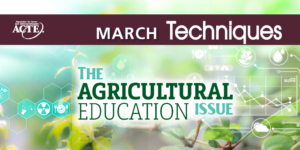Pathways. This one word illustrates a vision for success. A student takes a course in high school that sparks a passion for career and technical education (CTE). Then they consider postsecondary credentials that will prepare them for the workforce. Finally, they graduate and find a fulfilling career.
The lingering question is, why do we lose students in the transitions? Often, there aren’t strong connections being made between each of the phases. So, in Minnesota, stakeholders identified a need to better carve out the pathways and strengthen the connecting points, specifically between secondary and postsecondary education. And over the past few years, a concerted effort has been made to focus on connecting with students and educators.
Make career connections with students.
Minnesota State Colleges and Universities hosts eight Centers of Excellence that support workforce development in high-demand industries. Two of these focused on agriculture. AgCentric and the Southern Agricultural Center of Excellence (SACE) offer career exploration activities for students of all ages.
Encouraging learners to consider jobs in agriculture, food and natural resources (AFNR), agricultural education advocates visit classrooms. They host booths at career fairs and other events, travel the state with their technology trailer, invite students to tour their campuses, and lead numerous conference workshops. In fact, they visited 75 schools and impacted thousands of students over the past year!
In addition to the in-person activities, they lead efforts in creating career exploration resources that secondary agriculture teachers can use in their classrooms. These include an interactive website and social media profiles, career pathway brochures, posters, vinyl banners and more. The work of these passionate and focused individuals has been critical in reaching new audiences and sharing the message about high-growth careers in AFNR.
AgCentric and SACE partnered with the Minnesota FFA to reimagine a career exploration event at the 2022 Minnesota State FFA Convention, called Career Connections.
With nearly 5,000 FFA members and guests attending the Convention, CTE leaders seized a prime opportunity to explore careers and connect students with opportunities in agriculture. Although a form of it had been done in the past, a larger event was planned. Students engaged with work-based learning simulators, spun wheels to win prizes, learned about internships and scholarships, and much more. All with the intent to encourage their pursuits after high school. FFA students met more than 150 education and industry representatives from more than 60 schools and organizations. And in addition to the AFNR content areas, a Teach Ag booth urged students to think about becoming educators.
Make career connections with educators.
Minnesota helps students make connections to guide them between steps on the path to fulfilling careers. But CTE educators also need support to thrive. They need resources in order to provide accurate and timely advice about postsecondary options.
Often, our knowledge is limited to the programs we went through, or secondhand information gleaned from people we’ve worked with. But secondary educators hold strong influence over students’ postsecondary decision-making. To promote information sharing, and thus increased opportunities, the Minnesota Association of Agricultural Educators (MAAE) hosted a Reverse College Fair during their annual professional development conference. This indirect recruiting event brought college faculty (not recruiters) and secondary AFNR teachers together to share about curricula, articulation agreements, classroom visits and tour opportunities.
Most importantly, it allowed them to network and make connections. At the most recent Reverse College Fair, 59 faculty and deans from 13 higher education institutions hosted 41 tables featuring unique programs. Both secondary and postsecondary instructors appreciate the opportunity to share knowledge and foster better relationships within MAAE.
Educators must engage in continuous learning.
Minnesota State Centers of Excellence launched a Train the Trainer series of workshops to help teachers fine-tune their technical skills. Hosted by local community colleges, industry and higher education experts provide professional development for secondary teachers. Topics included small gas engines, welding, energy and drones.
Workshops are meant to meet teachers where they are. And to provide safe and inclusive environments in which to learn necessary skills for success in the classroom. Beyond the skill development, the trainings also connect secondary teachers to postsecondary faculty, building long-term relationships that can benefit students as they navigate transitions.
Conclusion
Finally, that student joins the workforce. But what happens if their program of study wasn’t aligned with workforce needs? Across the state of Minnesota, educators know their students need to explore careers and gain real-world experience. Thus, the Agriculture and Workforce Talent Coalition was created to link education and industry and to share connection opportunities within Agriculture, Food and Natural Resources.
So, how could this look in your state? Meet the students where they’re already gathered — such as at a career and technical student organization event — and invite partners to speak or answer questions. Further, conduct outreach among students who haven’t entered the CTE classroom. Provide handouts and digital resources that outline clear career pathways and how students may reach their goals. Finally, make sure to create partnerships with education and industry stakeholders alike. Students enter and exit CTE pathways at various points in their lives, and they need support, in the form of connection and resources, throughout.
Sarah Dornink is the executive director for the Minnesota Agricultural Education Leadership Council, a 16-member legislative council dedicated to promoting and expanding agricultural education at all levels. She has nearly 20 years of experience advocating for agricultural education.







